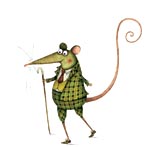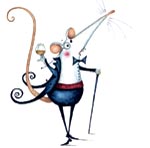Country mouse laments lost words
Country mouse considers the words that have been culled from the latest Oxford Junior Dictionary.


If you found yourself reaching for a thick jumper last weekend, you were part of what is known as the blackthorn winter.
The snowy blossom of the wild plum bursts out during a cold snap. For me, it signifies the turning of the tide and is written in the mud suddenly, the ground dries up and bears the print of tractor tyres and deer before cracking into hexagonal shapes. It’s caused by the warmer weather, but, more especially, by the flora sucking up the precious water as it bursts into new leaf following months of being dormant.
If only the new edition of the Oxford Junior Dictionary had remained dormant. As Robert Macfarlane wrote in The Guardian: ‘A sharp-eyed reader noticed that there had been a culling of words concerning nature. Under pressure, Oxford University Press revealed a list of the entries it no longer felt to be relevant to a modern-day childhood.
The deletions included acorn, adder, ash, beech, bluebell, buttercup, catkin, conker, cowslip, cygnet, dandelion, fern, hazel, heather, heron, ivy, kingfisher, lark, mistletoe, nectar, newt, otter, pasture and willow. The words taking their places in the new edition included attachment, block-graph, blog, broadband, bullet-point, celebrity, chatroom, committee, cut-and-paste, MP3 player and voice-mail… For blackberry, read BlackBerry’. How sad.

Town mouse organises his library
Town mouse enjoys spring cleaning his study.

Spectator: Lost in space
Lucy Baring blasts into space.
Exquisite houses, the beauty of Nature, and how to get the most from your life, straight to your inbox.
Mark grew up in the Cotswolds and began his career as a gold prospector. He became editor-in-chief of Country Life in 2006, having previously been in charge of more than 50 magazines, including Horse & Hound. He attributes his success to David Bowie and fly-fishing.
